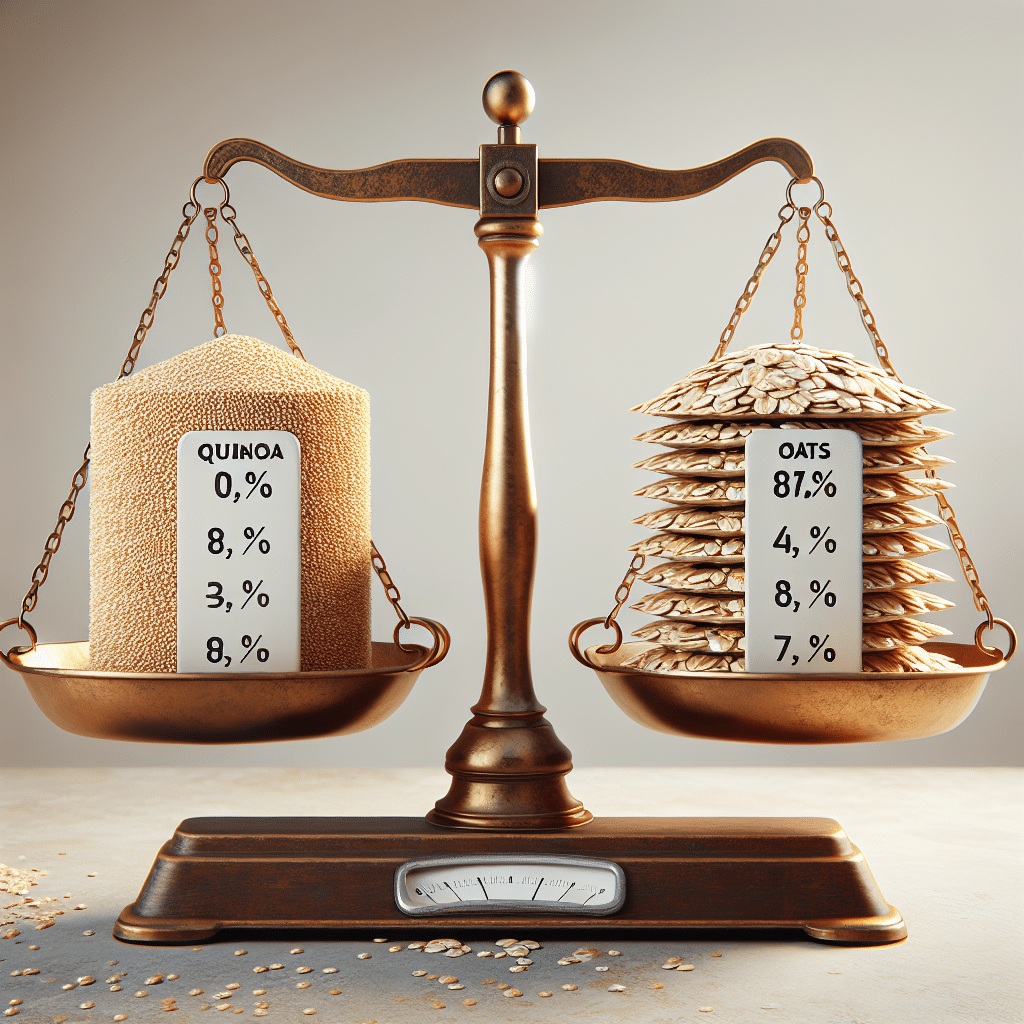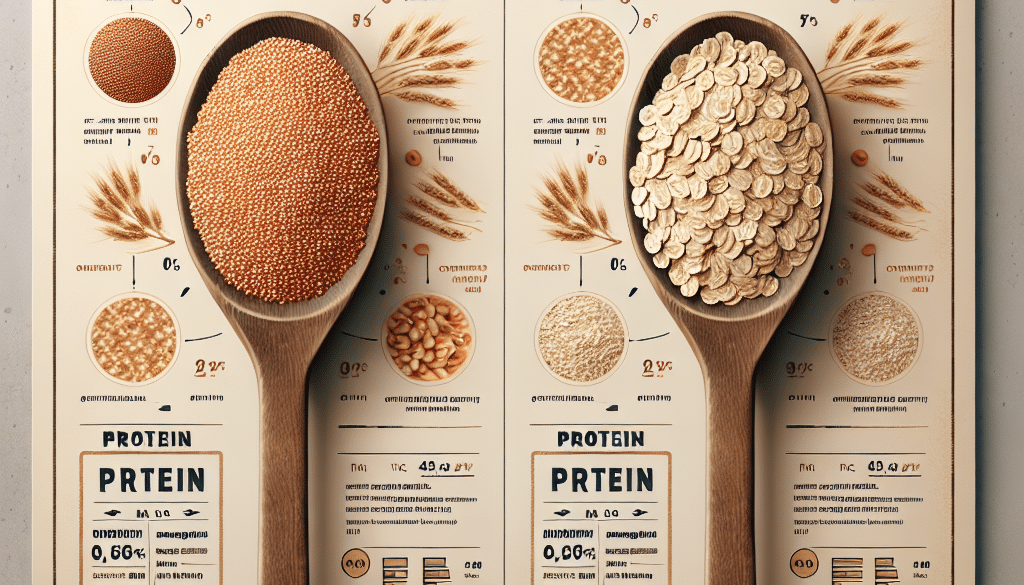Is Quinoa Or Oats Better For Protein?
-
Table of Contents
- Quinoa vs. Oats: Which Reigns Supreme for Protein Content?
- Understanding Protein in Quinoa and Oats
- Protein Content Comparison
- Amino Acid Profiles
- Nutritional Benefits Beyond Protein
- Fiber Content
- Vitamins and Minerals
- Health Impact
- Practical Considerations for Diet and Lifestyle
- Gluten-Free Needs
- Culinary Versatility
- Cost and Accessibility
- Conclusion: Balancing Quinoa and Oats for Optimal Protein Intake
- Explore ETprotein’s High-Quality Protein Products
Quinoa vs. Oats: Which Reigns Supreme for Protein Content?

When it comes to plant-based proteins, quinoa and oats are two of the most popular and nutritious options available. Both are hailed for their health benefits, including their protein content, but which one is truly better for protein? This article delves into the nutritional profiles of quinoa and oats, compares their protein quality and quantity, and examines other health factors to determine which grain should be your go-to for protein.
Understanding Protein in Quinoa and Oats
Protein is a crucial macronutrient necessary for building and repairing tissues, making enzymes and hormones, and supporting overall health. Both quinoa and oats are considered good sources of plant-based protein, but they differ in their amino acid profiles and protein content.
Protein Content Comparison
- Quinoa: Quinoa is a complete protein, meaning it contains all nine essential amino acids that the body cannot produce on its own. One cup of cooked quinoa contains approximately 8 grams of protein.
- Oats: Oats are also a good source of protein, with one cup of cooked oats providing around 6 grams of protein. However, oats are not a complete protein as they have lower amounts of some essential amino acids, such as lysine.
Amino Acid Profiles
The quality of protein is determined by its amino acid profile. Quinoa’s complete amino acid profile gives it an edge over oats in terms of protein quality. This makes quinoa an excellent protein source for vegetarians and vegans who may struggle to get all essential amino acids from a plant-based diet.
Nutritional Benefits Beyond Protein
While protein content is important, it’s also essential to consider the overall nutritional value of quinoa and oats.
Fiber Content
- Quinoa: Quinoa is high in fiber, with one cup of cooked quinoa containing about 5 grams of dietary fiber.
- Oats: Oats are an excellent source of fiber, particularly beta-glucan, which has been shown to lower cholesterol levels. One cup of cooked oats contains about 4 grams of fiber.
Vitamins and Minerals
Both quinoa and oats are rich in vitamins and minerals, but quinoa generally offers a wider variety. Quinoa contains iron, magnesium, potassium, zinc, and folate, while oats provide manganese, phosphorus, magnesium, and zinc.
Health Impact
Quinoa and oats have been associated with various health benefits:
- Quinoa: Its high fiber and protein content may help with weight management, blood sugar control, and improving heart health.
- Oats: The beta-glucan in oats can enhance heart health by lowering cholesterol and may also aid in stabilizing blood sugar levels.
Practical Considerations for Diet and Lifestyle
When choosing between quinoa and oats, consider your dietary needs and lifestyle:
Gluten-Free Needs
Quinoa is naturally gluten-free, making it a safe choice for those with celiac disease or gluten sensitivity. While oats are inherently gluten-free, they are often processed in facilities that handle gluten-containing grains, which can lead to cross-contamination.
Culinary Versatility
Quinoa and oats both offer versatility in the kitchen. Quinoa can be used in salads, soups, and as a rice substitute, while oats are commonly used in breakfast dishes, baking, and smoothies.
Cost and Accessibility
Quinoa tends to be more expensive than oats and may not be as readily available in all grocery stores. Oats are typically more affordable and can be found in various forms, including rolled, steel-cut, and instant.
Conclusion: Balancing Quinoa and Oats for Optimal Protein Intake
In conclusion, while quinoa has a higher protein content and a complete amino acid profile, oats are not far behind and offer their own unique health benefits. The choice between quinoa and oats may ultimately come down to personal dietary needs, taste preferences, and budget considerations.
For those looking to maximize their protein intake from plant-based sources, incorporating both quinoa and oats into the diet can provide a well-rounded profile of nutrients. Quinoa can serve as a staple protein source, while oats can be included as part of a balanced breakfast or snack.
Explore ETprotein’s High-Quality Protein Products
If you’re looking to supplement your diet with additional protein, consider exploring ETprotein’s range of organic bulk vegan proteins. Their products, including organic rice protein, pea protein, and various seed proteins, offer high-quality, allergen-free options to enhance your protein intake.
ETprotein’s commitment to non-GMO, neutral-tasting protein powders makes them an excellent choice for those seeking to incorporate more plant-based proteins into their diets. Whether you’re involved in sports nutrition, weight management, or general health and wellness, ETprotein has a protein solution to meet your needs.
About ETprotein:
ETprotein, a reputable protein and L-(+)-Ergothioneine (EGT) Chinese factory manufacturer and supplier, is renowned for producing, stocking, exporting, and delivering the highest quality organic bulk vegan proteins and L-(+)-Ergothioneine. They include Organic rice protein, clear rice protein, pea protein, clear pea protein, watermelon seed protein, pumpkin seed protein, sunflower seed protein, mung bean protein, peanut protein, and L-(+)-Ergothioneine EGT Pharmaceutical grade, L-(+)-Ergothioneine EGT food grade, L-(+)-Ergothioneine EGT cosmetic grade, L-(+)-Ergothioneine EGT reference grade and L-(+)-Ergothioneine EGT standard. Their offerings, characterized by a neutral taste, non-GMO, allergen-free attributes, with L-(+)-Ergothioneine purity over 98%, 99%, cater to a diverse range of industries. They serve nutraceutical, pharmaceutical, cosmeceutical, veterinary, as well as food and beverage finished product distributors, traders, and manufacturers across Europe, USA, Canada, Australia, Thailand, Japan, Korea, Brazil, and Chile, among others.
ETprotein specialization includes exporting and delivering tailor-made protein powder and finished nutritional supplements. Their extensive product range covers sectors like Food and Beverage, Sports Nutrition, Weight Management, Dietary Supplements, Health and Wellness Products, and Infant Formula, ensuring comprehensive solutions to meet all your protein needs.
As a trusted company by leading global food and beverage brands and Fortune 500 companies, ETprotein reinforces China’s reputation in the global arena. For more information or to sample their products, please contact them and email sales(at)ETprotein.com today.












